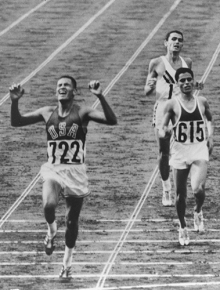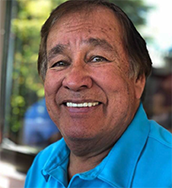
- Details
- By Levi Rickert
Oglala Sioux Citizen Will Wait a Year to Return to City Where His “Journey” Began
SACRAMENTO — With the ongoing COVID-19 pandemic threatening lives worldwide, Japan’s Prime Minister Shinzo Abe and International Olympic Committee President Thomas Bach announced Tuesday morning that the Tokyo 2020 Olympics will be postponed by about one year.
The 2020 Olympics opening ceremony was planned for July 24 in Tokyo, Japan.
Olympic gold-medalist Billy Mills (Lakota), 82, had planned to attend the Olympic games this summer. Now, his journey to Tokyo, the city where he won his medal as the top finisher in the 10,000-meter run during the 1964 games, will have to wait.
“There are seven of us, my wife, daughters and others, who were going to go. I wanted my daughters and others to see where my wife Pat and I began our journey 58 years ago,” Mills told Native News Online on Tuesday evening from his home in California.
“The International Olympic Committee made the right decision to postpone the games. Obviously, if this virus passes quicker than people think, there will be a lot of criticism. But, right now, we need to concentrate on beating this virus,” Mills said.
“I think back to 1964 when I won my gold medal. Japan was still recovering from World War II. They were awarded the games to be played there and it was a new rebirth for Japan. Children who were born shortly after the atomic bombs were dropped were able to see their world come together as one at those games,” Mills reflected.
 Billy Mills
Billy Mills
“In 2021, Japan will once again see the power of the world coming together after we get through the current crisis. Next year in Japan, the games will revitalize the world.”
True to a true athlete’s mindset, Mills says we all must be disciplined about our daily lives and adhere to the advice to practice social distancing and washing our hands.
“In order to keep our freedom, we have to practice discipline. As a Lakota, I love to practice the attributes of a warrior. Our warriors were disciplined. They had courage, bravery and fortitude. Our warriors always reached out and helped others. The Lakota believe we should live our lives with virtue and values. I will do whatever I have to do to stay healthy,” Mills said.
Mills says we should not fall prey to the Achilles heel of greed, but do what is needed to safeguard the total community.
Mills is a member of the Oglala Sioux Tribe and grew up on the Pine Ridge Indian Reservation. He attended Haskell Indian Nations University and the University of Kansas. Mills attended KU on an athletic scholarship and was a three-time NCAA All-American cross-country runner.
During the 1964 Summer Olympics, Mills won an Olympic gold medal in the 10,000 meters, and he remains the only American to ever win the event. Mills’ win in the 10,000 meters is considered one of the greatest upsets in Olympic history.
Mills says he is looking forward to the 2021 Olympic games.
More Stories Like This
Native News Weekly (August 25, 2024): D.C. BriefsUS Presidents in Their Own Words Concerning American Indians
Native News Weekly (December 14, 2025): D.C. Briefs
Wounded Knee Massacre Site Protection Bill Passes Congress
Two Murdered on Colville Indian Reservation
Help us defend tribal sovereignty.
At Native News Online, our mission is rooted in telling the stories that strengthen sovereignty and uplift Indigenous voices — not just at year’s end, but every single day.
Because of your generosity last year, we were able to keep our reporters on the ground in tribal communities, at national gatherings and in the halls of Congress — covering the issues that matter most to Indian Country: sovereignty, culture, education, health and economic opportunity.
That support sustained us through a tough year in 2025. Now, as we look to the year ahead, we need your help right now to ensure warrior journalism remains strong — reporting that defends tribal sovereignty, amplifies Native truth, and holds power accountable.
 The stakes couldn't be higher. Your support keeps Native voices heard, Native stories told and Native sovereignty defended.
The stakes couldn't be higher. Your support keeps Native voices heard, Native stories told and Native sovereignty defended.
Stand with Warrior Journalism today.
Levi Rickert (Potawatomi), Editor & Publisher

